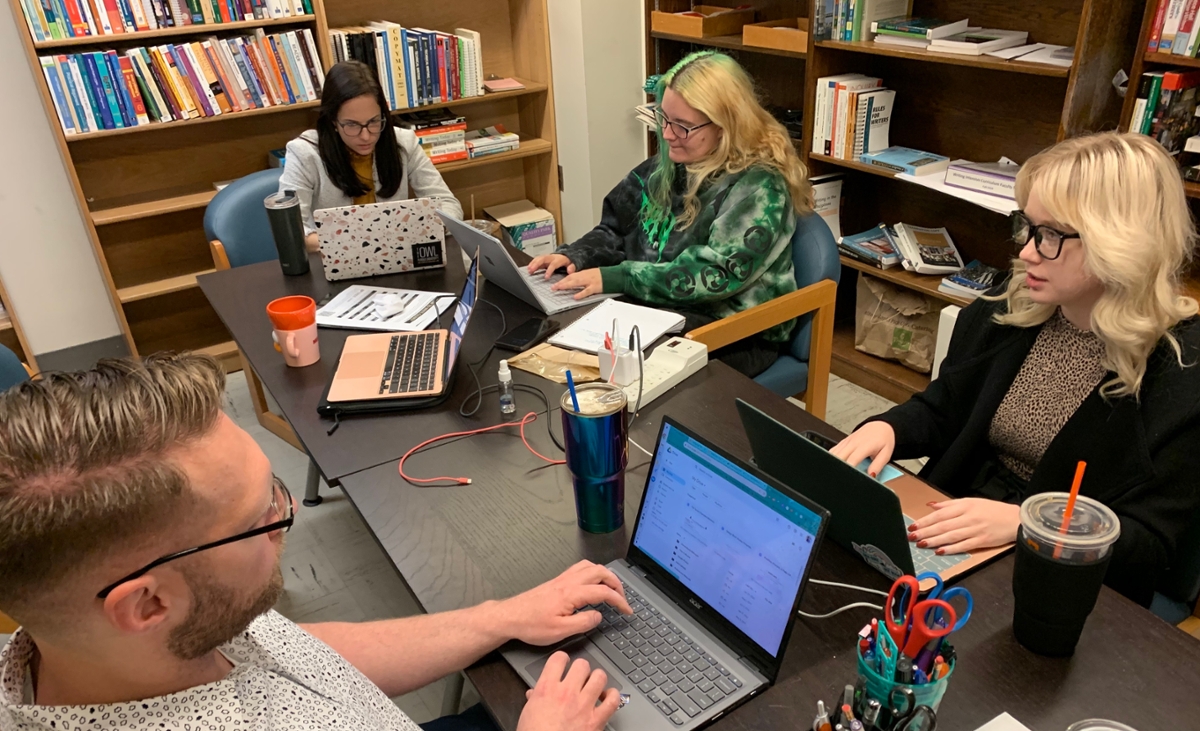Info for Prospective Students

A note on admissions
The Department of English alternates incoming cohorts between Literature, Theory, Cultural Studies (LTC) and Rhetoric and Composition (RC) programs. We are currently (Fall 2025) accepting applications for rhetoric & composition doctoral students who wish to begin their studies in Fall 2026. We not not plan to admit masters-seeking students in the near future.
We have recently extended our application deadline to January 9, 2026.
Interested in applying? Read our FAQ and find out how to apply.
Curriculum
Our curriculum pairs a breadth-oriented core (classical rhetoric, postmodern rhetoric, composition studies, and empirical research methods) with deeper focus in one or more secondary areas, which immerses graduates in the field as a whole as well as their own research area.
Our program is also structured around students, with a cohort system to help incoming students bond in addition to program functions like Hutton lectures, the annual program picnic, and the annual reunion at CCCC. As a result, students tend to engage in a lot of near-peer mentoring in addition to mentoring they get from faculty.
Research Areas
Our PhD candidates do work across the breadth of the field, in areas like:- professional and technical writing
- cultural rhetorics
- rhetorics of health and medicine
- writing program administration
- writing center theory and administration
- public rhetorics
- digital rhetorics
- game studies
- queer rhetorics
- feminist rhetorics
Our secondary areas (specializations) cover a wide range of the field and offer enough flexibility for most students to be able to design the curriculum that best suits their needs and interests.
Many students develop research studies related to their work in teaching, tutoring, and administration, and students often have opportunities to take part in work faculty are doing in these areas, often up to and including co-authored conference presentations and publications.
Students also often form informal writing groups while working on program phases like preliminary exams and the dissertation. Collaboration is common among our community, and students often propose conference panels and publications with classmates or fellow teachers or tutors. Some of our recent graduates claim this collaboration and extended network as one of the most valuable things they gained in their time here at Purdue.
Job Market Resources & Placement
Our placement rate for students seeking tenure track jobs is above 90% in the last ten years. Our graduates work in a variety of different positions as: faculty members, writing program and writing center administrators; graduate program directors; department heads and other higher administrative positions. Our graduates have also found success in industry as: editors; usability experience designers; and professional and technical writers/managers, to name a few.
Purdue & Greater Lafayette
West Lafayette and Lafayette are, together, the largest metropolitan area in the surrounding region, which is pretty rural. Larger urban centers nearby include Chicago, which is roughly 2-3 hours away (depending on traffic), and Indianapolis, which is about an hour away. The Greater Lafayette area has most common businesses, a wide range of restaurants, and a number of parks and hiking trails (some are a little ways outside the city). Anything that Lafayette might not have can usually be found in Indianapolis.
All accepted graduate students receive a tuition waiver and an assistantship or fellowship. The cost of living in Greater Lafayette is fairly low compared to some other university towns, and stipends have been rising consistently for the last several years. Most students are able to live alone on their stipends.
Application Requirements
You can view application requirements on this page. Note that all of the graduate programs in English no longer require the GRE.
Faculty & Current Students
You’re welcome to contact faculty directly with any questions about their work or the program. The Director of Graduate Studies, Dr. Bradley Dilger, can answer technical questions about admissions at dilger@purdue.edu.